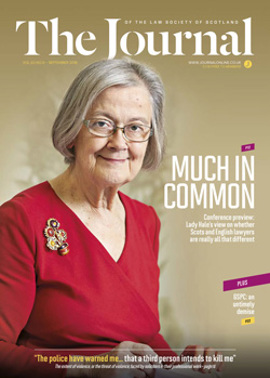President's column
One of the really interesting and rewarding parts of the President’s role is to meet the office bearers and chief executives of the Law Societies of England & Wales, Northern Ireland and Ireland. These meetings take place every six months and the venue rotates around Edinburgh, Dublin, Belfast and London.
This summer we visited the Fair City of Dublin, in the magnificent setting of the Council Chamber in Blackhall Place.
There is a great similarity of hot topics among our jurisdictions, but not always with the same solutions. The “craic” is always stimulating and lively, increasingly so once the new office bearers bed in and find their feet and voices. Of course, the golden thread running through it all is the presence of Lorna Jack, Ken Murphy, Alan Hunter and Paul Tennant as CEOs, whose memories and knowledge of their part of this jigsaw are profound and invaluable.
Brexit means what?
In Dublin we discussed, inevitably, Brexit and the likely impact on lawyers and legal services across our borders. It was noted we were still not any further on since the January meeting in London on what kind of Brexit agreement will be reached – hard, soft or none, although planning for a “no deal” was being stepped up in all jurisdictions, reviewing specific risks to the profession.
Other discussions included maintaining the rights of exchange which are regarded as mutually beneficial for all jurisdictions; the Irish border question; stability in the law; respect for the legal profession; security and justice issues; recognition and enforcement of citizens’ rights; employment status; rights of audience in EU courts; enforcement of judgments; the impact of the lack of a Northern Ireland executive and assembly, and the effect on life there with no focus on common purpose.
We advised that our Society has been monitoring Brexit developments closely and already actively promoting the interests of our members and the public to politicians and civil servants, which we will continue to do.
At the IBA Conference in Oslo earlier this year, Hans-Jürgen Hellwig expressed the view that the legal profession may become secondary to commercial drivers and interests, with lawyers
largely ignored in the Brexit process. In Dublin we discussed ways of lobbying effectively and the benefit of getting together with other forces/professions/business interests, underlining the important economic and other values of the legal profession to our jurisdictions and the rule of law – this is something we are taking forward.
Others’ perspectives
There were similarities in all four jurisdictions relating to rural practice and the particular challenges these firms face in the future. In Ireland for example, 63% of the profession practise in Dublin with the remainder across the country, some in larger towns such as Cork but most in rural pockets.
Northern Ireland is carrying out a review of sole practitioners, starting with a focus group, and will share the findings with us.
In June this year, the Law Society of Ireland Council approved a major review of legal education and training. This was brought about because the Legal Services Regulatory Authority sought submissions as part of a public consultation, prior to a report to the Minister for Justice on the education and training arrangements there for legal practitioners. Independent international experts on legal education were commissioned, led by Professor Paul Maharg, who used to sit on our own Education & Training Committee. The result was 30 recommendations for change, including the establishment of a centre for teaching, development and innovation. The FE-1 entrance examination will remain in place as an entrance assessment for those wishing to train as solicitors in Ireland. The Irish say this ensures a common knowledge of core legal subjects including from non-law graduates. Trainees will be able to complete PPC courses with other educators or professional bodies as well as the Law Society of Ireland.
It’s interesting to hear such an example of a totally different approach to regulation and to becoming a solicitor from us here in Scotland, prompted by the Irish Legal Services Regulatory Authority being bound by statute to deliver to the minister by October 2018.
There is certainly a lot to share and just as much to be learned from our four jurisdiction meetings, which will continue whether or not we have a soft/hard/no deal Brexit six months from now.
In this issue
- Confidence restored: internal investigations and legal privilege
- Court reforms: still an unknown quantity
- Ruled out of court?
- Uncovering the environment (1)
- Medical death: a case to answer
- Reading for pleasure
- Opinion: Kerry Trewern and Rhona McNair
- Book reviews
- Profile: Ryan McCuaig
- President's column
- Developing digital services
- People on the move
- Leading judgment
- Health check
- Open to attack
- Claims: beating the trigger
- Storage: time for digital
- GSPC: eulogy for a friend
- Relevant persons: a challenge
- New specialist land registration practice launches
- Good enough reason?
- Copyright: underpinning control
- Writing means writing
- Rent moves: two crucial hoops
- Debtor wins in policy decision
- Scottish Solicitors' Discipline Tribunal
- KIR: the time bomb explodes
- The guideline goal
- GC NextGen: a network for you?
- Your Law Society of Scotland Council members
- Public policy highlights
- Double boost for Society's AML team
- Ask Ash
- Practice rights and the impact of Brexit: working in the EU
- Acting as notary: what do I need to know?
- Engagement letters: a practical approach
- Uncovering the environment
- Paralegal pointers






